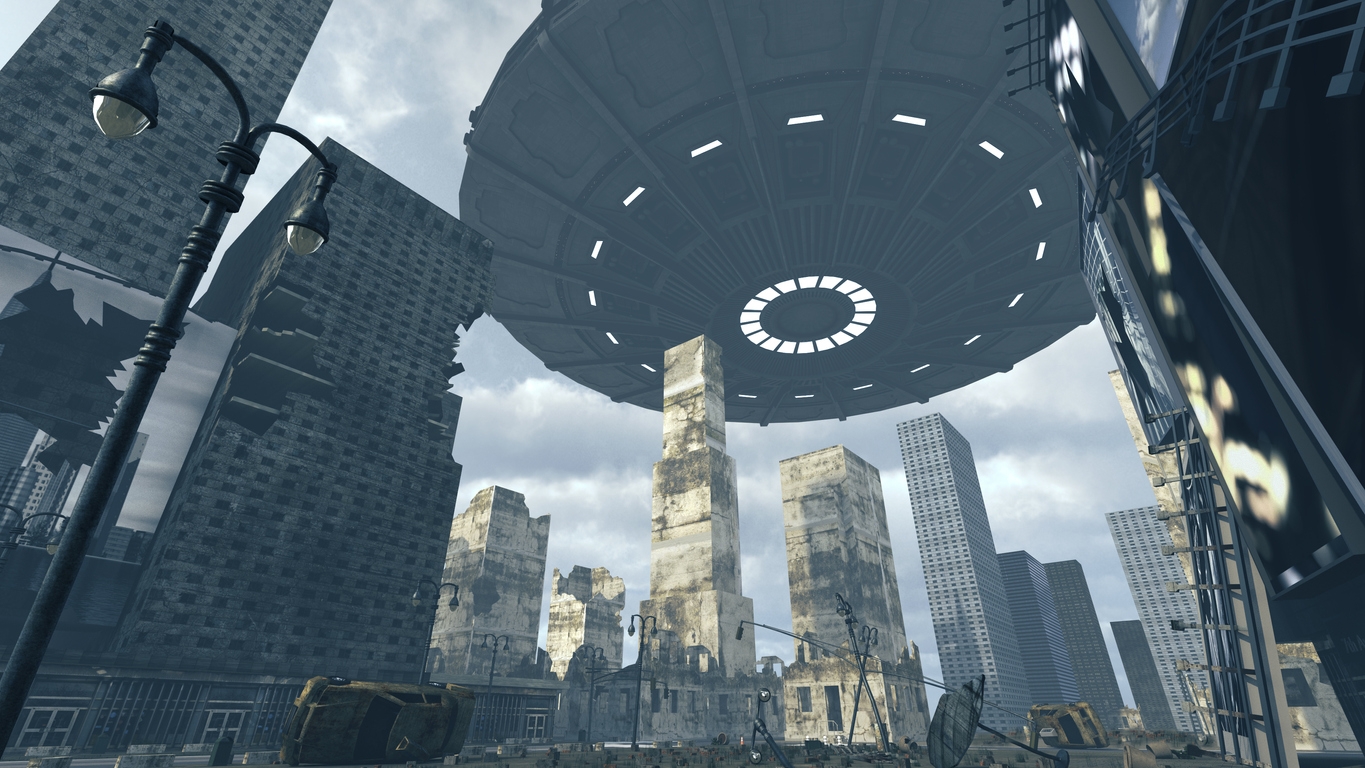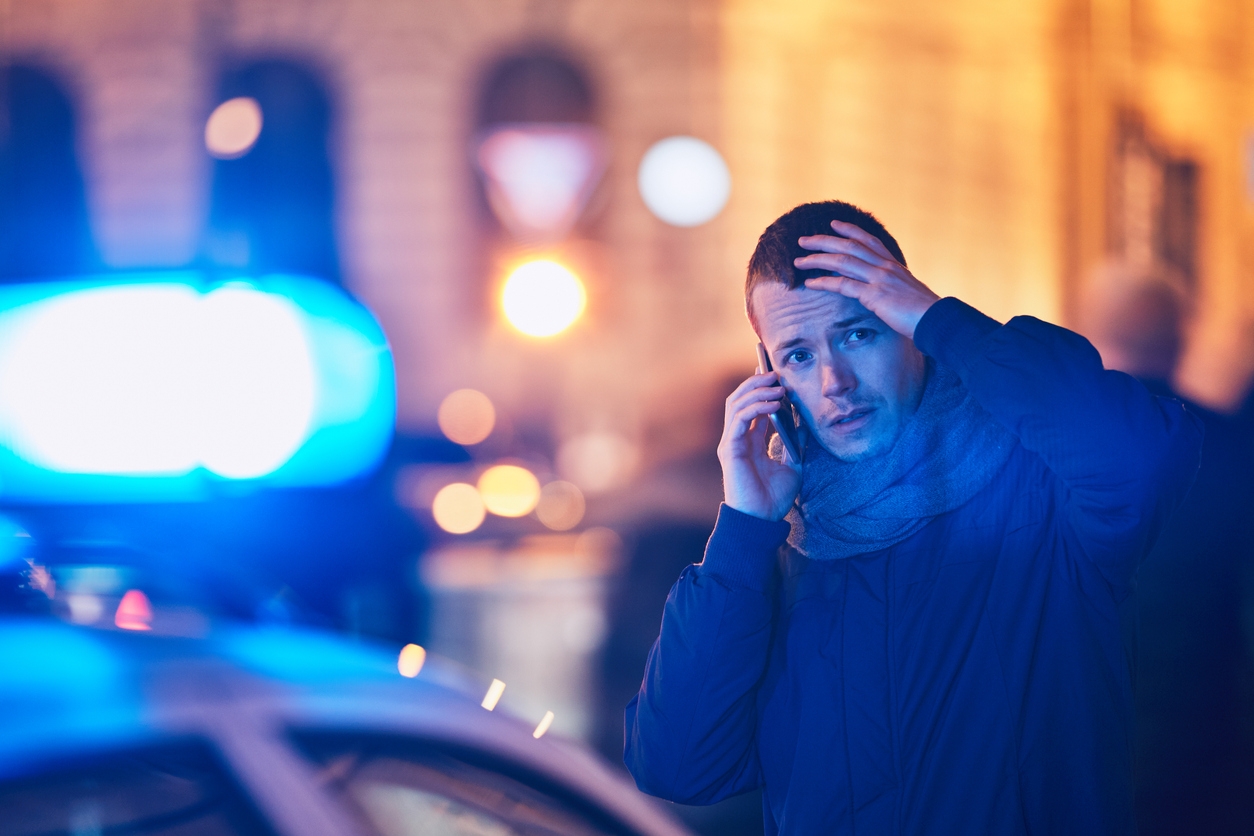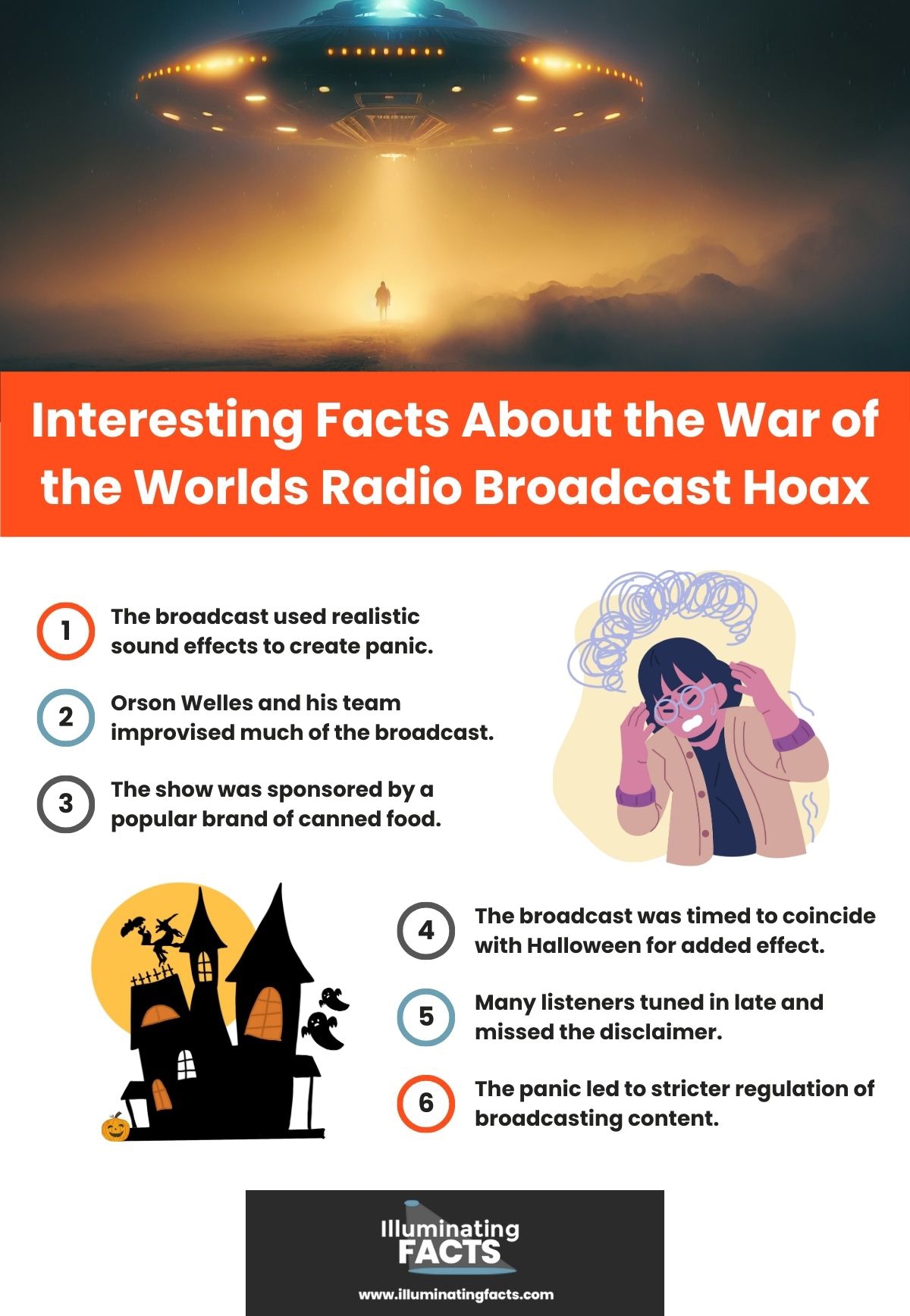It was October 30, 1938, and Orson Welles, the legendary storyteller, was about to embark on a Halloween radio broadcast that would make headlines around the world. The program was a chilling adaptation of H.G. Wells’ “War of the Worlds,” and it was designed to scare the living daylights out of its listeners. But what happened next was beyond anyone’s wildest imagination.
As Welles’ voice boomed over the airwaves, people across the country tuned in, unaware of the chaos that was about to ensue. Within minutes, reports began to pour in of Martians landing on Earth and wreaking havoc on cities and towns across America. Panic spread like wildfire as people scrambled to protect themselves and their loved ones. But was it all just a hoax? A cleverly crafted prank that got out of hand? Or was it something far more sinister?
In this article, we’ll explore the background of the War of the Worlds broadcast and delve into the public response, which ranged from sheer terror to disbelief. We’ll also take a closer look at the government’s reaction to the hysteria and the lasting impact that the event had on American culture. So get ready to suspend your disbelief, as we unravel the mysteries surrounding one of the most perplexing events in modern history.
What is War of the Worlds about?
“The War of the Worlds” is a seminal work of science fiction that has captured the imagination of readers for over a century. Written by H.G. Wells, the novel tells the story of an alien invasion of Earth. [1] Beneath its surface a complex web of themes and motifs that explore the darkest fears and anxieties of humanity. The story revolves around the sudden and brutal invasion of Earth by ruthless and technologically advanced Martians, who unleash chaos and destruction on an unsuspecting population.
But what makes “The War of the Worlds” truly remarkable is not just its thrilling plot, but also the way in which Wells masterfully weaves together different elements to create a sense of perplexity and terror that lingers long after the last page has been turned.
One of the key themes of the novel is the concept of the unknown and the fear of the unfamiliar. Wells expertly taps into this deep-seated human fear to create a sense of tension and unease that permeates throughout the story. The sudden and violent arrival of the Martians, with their massive tripods and deadly heat rays, is a shock to the system that upends the established order and throws humanity into chaos.
At its core, The War of the Worlds is a cautionary tale about the dangers of colonialism and imperialism. Wells uses the allegory of the Martian invasion to comment on the brutality and inhumanity of colonialism, as well as the catastrophic consequences that can arise when one culture attempts to dominate and exploit another. Overall, the novel themes of fear, survival, and the dangers of unchecked power continue to resonate with readers today, making it a must-read for fans of the genre.
War of the Worlds Radio Broadcast
The War of the Worlds radio broadcast is a mind-blowing event that shook the nation to its core on October 30, 1938. Orson Welles and his Mercury Theater company pulled off a masterful adaptation of H.G. Wells’ classic science fiction novel into a radio play that would go on to cause mass hysteria and pandemonium across the United States.
From the opening news bulletins, listeners were plunged into a terrifying alien invasion that seemed all too real. The storytelling was so convincing that it sent shockwaves through the nation, with many listeners convinced that the broadcast was genuine. [2] The result was an eruption of chaos and confusion, as people fled their homes, called their loved ones, and took to the streets in a state of panic.
While the extent of the panic remains contested, there is no doubt that the War of the Worlds broadcast was a groundbreaking moment in media history. [3] It was a testament to the power of storytelling and the influence that media can have on the public. It also highlighted the need for responsible media consumption and critical thinking, as the broadcast showed the potential dangers of blindly accepting what we hear and see in the media.
The impact of the War of the Worlds broadcast cannot be overstated. It revolutionized the world of radio and paved the way for future radio dramas and plays. It also served as a stark reminder of the fragility of our society and the power that media holds over us.
The Public’s Response
The public’s reaction to the War of the Worlds broadcast was swift and severe, with millions of Americans tuning in and becoming convinced that an actual alien invasion was underway.
As the broadcast unfolded, people began to call friends and family to warn them of the supposed invasion. The news spread like wildfire, with people running through the streets and even taking to their cars to try and escape the Martians. The switchboards at radio stations were jammed with calls, and some panicked listeners even called the police.
The scale of the panic is still a topic of debate, but there is no doubt that the War of the Worlds broadcast caused widespread fear and confusion. The next day, newspapers across the country reported on the chaos and hysteria that had ensued, with headlines like “Terror By Radio” and “Radio Listeners in Panic, Taking War Drama as Fact.”
This type of reaction to the broadcast was in part due to the realistic performances of the actors and the use of sound effects, which made the broadcast seem like a genuine news report. It was also a reflection of the time, with World War II looming and tensions high.
Later after the broadcast, there were calls for greater regulation of the media, with some people blaming the broadcasters for causing unnecessary panic and distress. [4] Others argued that the public needed to be more responsible in their media consumption, and that people needed to be more discerning about what they believed.
All of that makes the War of the Worlds broadcast a fascinating case study in the power of the media to influence public opinion and behavior. It reminds us that the media can have a profound impact on our perceptions of reality and the world around us, and that we need to be responsible in how we consume and interpret information.
The Government’s Response
The government’s response to the War of the Worlds broadcast was a fascinating mix of confusion, panic, and decisive action. The incident was so unprecedented that officials were scrambling to understand what had happened and how to respond.
At first, many officials were themselves caught up in the hysteria. Reports suggest that even President Roosevelt himself had tuned in to the broadcast and was momentarily convinced that it was real.
As news of the panic spread, however, officials quickly went into damage control mode. [5] The FCC launched an investigation to determine if any laws or regulations had been violated, while state and local officials dispatched police and emergency services to deal with the chaos on the ground.
Secretary of the Interior Harold L. Ickes was one of the most vocal critics of the broadcast, calling it a “very grave mistake” and chastising the radio industry for its lack of self-regulation.
Despite the intense scrutiny, however, there were no major legal repercussions for the broadcasters or the network. The FCC investigation ultimately concluded that no laws had been broken, and no fines or penalties were imposed.
In a nutshell, the government’s response to the War of the Worlds broadcast is a fascinating example of how authorities can react in the face of unexpected events. The incident challenged long-held assumptions about the power of media and the role of government in regulating it, and the lessons learned continue to resonate today.
Was it Truly a Panic?
The War of the Worlds broadcast has long been a topic of controversy and intrigue, with many people debating the extent of the panic it caused. The debate continues to this day, with conflicting evidence and opinions from various sources. On one hand, NPR reports that there were indeed instances of panic in response to the broadcast, with some listeners calling the police and even committing suicide. [6] However, others argue that the idea of mass panic is largely a myth perpetuated by sensationalized news reports.
Despite the conflicting reports, it’s clear that the War of the Worlds broadcast had a significant impact on society and the media landscape. Some experts argue that it demonstrates the power of the media to influence public perception and behavior, while others see it as a cautionary tale about the dangers of spreading false information. The enduring popularity of the broadcast speaks to its lasting impact on popular culture, and its legacy as a work of art that continues to inspire and captivate audiences.
The debate over the broadcast’s impact is likely to continue for years to come, as new evidence and opinions emerge. But one thing is certain: the War of the Worlds broadcast remains one of the most fascinating and controversial events in the history of media, and its legacy will continue to be studied and debated for generations to come.
Interesting facts
- The broadcast used realistic sound effects to create panic.
- Orson Welles and his team improvised much of the broadcast.
- The show was sponsored by a popular brand of canned food.
- The broadcast was timed to coincide with Halloween for added effect.
- Many listeners tuned in late and missed the disclaimer.
- The panic led to stricter regulation of broadcasting content.
Conclusion
The War of the Worlds broadcast is one of the most notorious events in broadcast history, known for the alleged panic it caused. However, as we have seen, the extent of this panic has been greatly exaggerated over the years. Here are the key points to recap:
- The War of the Worlds broadcast was a radio play adaptation of H.G. Wells’ novel that aired on October 30, 1938.
- The broadcast was presented as a series of news bulletins that reported a Martian invasion of Earth, which caused confusion among some listeners who missed the opening disclaimer.
- Despite claims of widespread panic, most listeners did not believe the broadcast was real or take it seriously.
- The press coverage of the supposed panic was sensationalized and exaggerated, with many reports based on hearsay and anecdotes rather than actual evidence.
- While there were some instances of people being frightened or confused by the broadcast, the panic was largely a myth perpetuated by media coverage and subsequent retellings of the event.
- The War of the Worlds broadcast remains a fascinating case study in media history, demonstrating the power of mass media and the influence of sensationalist reporting on public perception.
In conclusion, while the broadcast did not cause widespread panic as initially claimed, it did have a significant impact on media and public perception. The event serves as a cautionary tale for the power of the media to shape public opinion, and the importance of responsible reporting and fact-checking.
References:
1. The war of the worlds. (2022, November 25). Encyclopedia Britannica. https://www.britannica.com/topic/The-War-of-the-Worlds-novel-by-Wells
2. Schwartz, A. B. (2015, May 6). The infamous “War of the worlds” Radio broadcast was a magnificent fluke. Smithsonian Magazine. https://www.smithsonianmag.com/history/infamous-war-worlds-radio-broadcast-was-magnificent-fluke-180955180/
3. Pooley, J., & Socolow, M. J. (n.d.). Orson welles’ war of the worlds did not touch off a nationwide hysteria. Few Americans listened. Even fewer panicked. Slate Magazine. https://slate.com/culture/2013/10/orson-welles-war-of-the-worlds-panic-myth-the-infamous-radio-broadcast-did-not-cause-a-nationwide-hysteria.html
4. Klein, C. (2013, October 30). Inside ‘The war of the worlds’ radio broadcast. HISTORY. https://www.history.com/news/inside-the-war-of-the-worlds-broadcast
5. History.com Editors. (2009, October 29). Orson welles’s “War of the worlds” radio play is broadcast. HISTORY. https://www.history.com/this-day-in-history/welles-scares-nation
6. 75 years ago, ‘War of the worlds’ started a panic. Or did it? (2013, October 30). NPR.org. https://www.npr.org/sections/thetwo-way/2013/10/30/241797346/75-years-ago-war-of-the-worlds-started-a-panic-or-did-it






